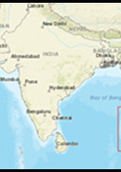Time to Leverage the Strategic Potential of Andaman & Nicobar Islands
A focused development plan for the Andaman and Nicobar Islands, which provide India with a commanding geostrategic presence in the Bay of Bengal and access to South and Southeast Asia, could greatly enhance the country’s geopolitical leverage in the Indian Ocean Region.
- Amb. Sujan R. Chinoy
- June 26, 2020










